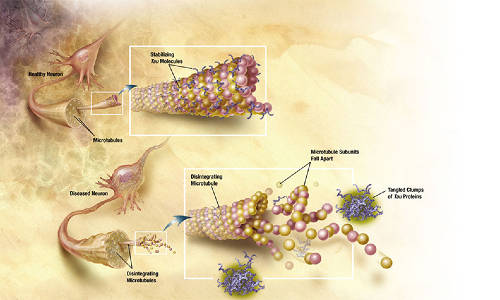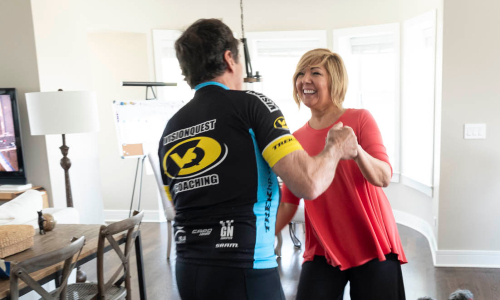RESOURCE CENTER
Caregiving for CTE
Support for suspected CTE caregivers
Those struggling with suspected Chronic Traumatic Encephalopathy (CTE) are not the only ones in need of support. Being a CTE caregiver can present enormous challenges, and caregivers are often so busy looking after their loved one they forget, or do not have enough time, to care for themselves. We understand how overwhelming this can feel. We want to equip you as a caregiver with the tools and resources you need to support yourself and your loved one with suspected CTE.
We're here for you in your journey as a suspected CTE caregiver. Our new Suspected CTE Caregivers Guidebook provides all the resources you need to navigate this difficult time. Sign up below to receive yours today.
Click here for a printable resource, watch our webinar below for an in-depth discussion, and scroll down for more resources.
The importance of self-care
As a caregiver for someone with suspected CTE, you have likely put your loved one’s needs first for a long time. This is understandable and common within the caregiving community. But we encourage you to remember that only when you first help yourself will you most effectively help someone else. Setting aside time for self-care so your needs are taken care of is an essential part of being a supportive caregiver. You may find sources of physical, emotional, mental and spiritual energy from the following activities or practices:
- Regular exercise, even for short periods at a time
- Stress reduction techniques such as meditation, mindfulness, yoga, and breathing practices
- Taking time to enjoy books, music, cooking and other healthy activities
- Getting proper rest and eating a healthy diet
- Socializing with friends and family, and seeking their support when you need it
Kim Adamle from The Mike Adamle Project: Rise Above is the wife of former NFL player and broadcaster Mike Adamle, who is living with probable CTE. In the video below, Kim explains how she avoids caregiver burnout, builds and maintains a support network, and establishes routines to keep herself strong. She also describes how she and Mike see themselves as partners in the fight against CTE, and how they establish honest and open communication.
Watch the video below to hear from both Kim and Mike about how they work together in the fight against CTE:
Reach out if you need help
Remember to put your own healthcare needs first. If you are feeling anxious, depressed, or generally burnt-out, consider reaching out to a licensed counselor for support.
Caregiving can be an isolating experience, especially when those around you don’t understand CTE. If you would like to be connected to a Peer Support Volunteer who has been a CTE caregiver, apply to the CLF Peer Support Program today.
Meditation and mindfulness for suspected CTE caregivers
Licensed psychologist and Concussion Legacy Foundation Legacy Family Community member Dr. Shannon Albarelli lost her husband Mike Albarelli in 2018. Mike was a high school football player, captain of the lacrosse team at Brown University, and a successful executive before he died at age 38 and was later diagnosed with CTE. Mike battled symptoms that Dr. Albarelli suspected were caused by CTE, and she turned to meditation to help her endure Mike's progressively worsening health. She now shares this practice with others who are struggling. Watch her lead a meditation session for those struggling with the long-term effects of brain injury and their loved ones.
Dr. Albarelli also appeared on our webinar for Supporting Suspected CTE Caregivers, where she and other suspected CTE caregivers offered advice and coping strategies. Hear Dr. Albarelli discuss her experience with CTE and how caregivers must prioritize their own self-care:
Maintain hope
As the caregiver for someone with suspected CTE, it is crucial that you and your loved one remain hopeful. Many symptoms of CTE are treatable, and there are resources to help someone suffering from suspected CTE find support and live a full life.
Watch Dr. Robert Stern, Director of Clinical Research at the Boston University CTE Center, explain why CTE is not a death sentence, how those who are suffering should have hope their symptoms can be treated, and why loved ones are so important in instilling that hope:
Caregiving in a crisis
Symptoms of CTE can include impulse control problems, aggression, depression, and paranoia. If your loved one is struggling to cope and needs emotional support, please call the National Suicide Prevention Lifeline by dialing 988 or 1-800-273-8255 and you will be connected to a trained counselor. It’s free, confidential, and available to everyone in the United States.
To learn how to best support your loved one who may be experiencing an emotional crisis, please watch this CLF webinar with mental health experts Dr. Ciara Dockery and Dr. David Reiss:
CTE and intimate partner violence
Liz Nicholson Sullivan is the wife of former Cleveland Browns offensive lineman Gerry Sullivan. When Gerry was diagnosed with early onset dementia and probable CTE, Liz became an advocate for retired NFL players, their wives and families. She and Gerry have agreed to share details about Gerry’s probable CTE diagnosis, including one of the ugliest sides of the disease not often discussed openly - domestic violence.
Watch Liz open up about her experience with Gerry’s CTE symptoms and hear her message to other wives and families struggling with the effects of suspected CTE including intimate partner violence: you are not alone.
Liz also joined our webinar and peeled back the curtain on what it’s like living with someone struggling with suspected CTE:
You May Also Like

Learn about symptoms, risk factors, and what causes the neurodegenerative disease Chronic Traumatic Encephalopathy (CTE).
What is CTE?
Living with suspected CTE can be difficult, but CTE is not a death sentence and it is important to maintain hope. Find out how.
Living with CTE